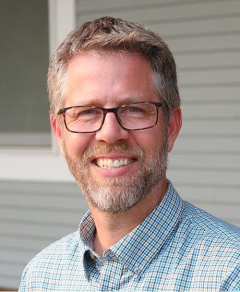Photo of Ben Locke, used with permission
As described in a 2025 report on Forbes.com, the president of the Association for University and College Counseling Center Directors argued that schools need to be proactive while addressing mental health concerns but also avoid an outdated crisis narrative. I’m on the executive board for the AUCCCD and know that many have described college mental health as being in a crisis. In 2023, the National Education Association even released a report entitled, “The Mental Health Crisis on College Campuses.” However, a 2024 report by The Chronicle of Higher Education highlighted how the crisis narrative is mainly a fear-based approach that could discourage help-seeking. According to this report, statistics regarding mental health concerns are alarming, but caution should be given before using the term crisis.
Dr. Ben Locke is a well-known psychologist with over 20 years of experience in college mental health. His research includes exploring the clinical operations of campus counseling centers, and he currently serves as the Chief Clinical Officer for Togetherall, a global service that provides online peer support. According to Locke, the crisis narrative in college mental health adds pressure to the entire campus. He stated, “Faculty and staff feel like they’re not qualified to help due to the narrative that you need to be a mental health professional to provide support to a student, parents are more worried, and counselors are under increasing pressure to do more and more.”
What Is The Crisis Narrative?
Locke described the crisis narrative as a dominate cultural ideology that evolved over the last 20 years. According to the psychologist, this narrative argues that mental health across the globe is in a crisis. Thus, the crisis narrative extends beyond higher education. Locke argued that the dominate narrative of a worldwide mental health crisis creates a self-reinforcing feedback loop. He said, “The more people hear about the crisis, the more they feel like they’re in a crisis.”
Locke didn’t deny the rise in mental health concerns. He stated, “The narrative doesn’t question whether or not people are struggling… it reflected an initial desire to provide enough resources to meet the increasing demand.” According to Locke, schools vary in the range of available mental health resources, but the crisis narrative tends to result in schools displaying increased reactivity to negative events that are part of the normative human experiences. This increased reactivity is often expanding clinical services but without questioning if this truly meets the needs of students and without implementing a strategic mental health plan.
How Did The Crisis Narrative Develop?
According to Locke, “The crisis narrative is made up a collection of ingredients, but these ingredients are not examined but just widely accepted.” Examples of these ingredients include well-intended advocates for mental health. According to the psychologist, it’s tempting for advocates to use the crisis narrative to argue for more resources. Another ingredient is the rise of industries related to mental health research and surveys. Locke pointed out that many of these industries are motivated to show that




